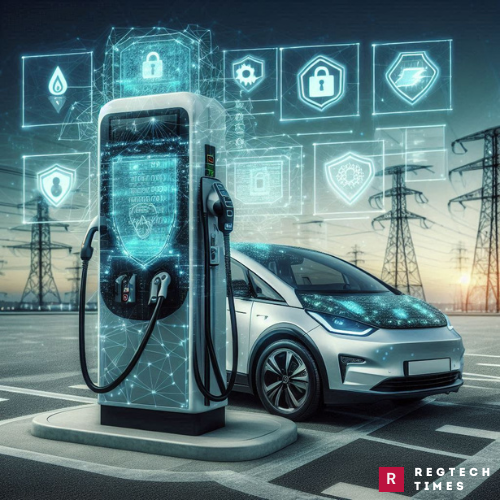As electric vehicles (EVs) continue to surge in popularity, the infrastructure supporting them—most notably EV chargers—becomes increasingly vital. However, these charging stations, integral to the green transportation revolution, face significant cybersecurity threats. This article delves into the vulnerabilities of EV chargers, the associated risks to personal data, and the potential impact on the power grid, while emphasizing the importance of robust cybersecurity measures.
EV Charger Vulnerabilities
Electric vehicle chargers are a crucial part of the Internet of Things (IoT) ecosystem. Like other IoT devices, the EV charger is susceptible to cyberattacks. The interconnected nature of these devices makes them attractive targets for hackers seeking to exploit security weaknesses. As the number of EVs on the road grows, so does the potential for cyber threats targeting the charging infrastructure.
Types of Cyber Threats
EV chargers face various types of cyber threats, including data breaches, malware attacks, and unauthorized access. Hackers can exploit vulnerabilities in the software or hardware of the EV charger, potentially gaining control over the devices. This unauthorized access can lead to numerous issues, from simple disruptions in service to more severe attacks that could compromise the entire charging network.
Personal Data Risks
One of the most significant concerns with compromised EV chargers is the risk to personal data. When users plug in their EVs, sensitive information, such as payment details and user credentials, is transmitted. If an EV charger is hacked, this data could be intercepted and stolen. The stolen information could then be used for fraudulent activities, posing severe risks to users’ financial security and privacy.
Impact on the Power Grid
Beyond individual data risks, the potential for a coordinated cyberattack on multiple EV chargers poses a threat to the broader power grid. Such an attack could disrupt the flow of electricity, leading to power outages or fluctuations. These disruptions would not only affect the charging infrastructure but could also impact homes, businesses, and critical services dependent on a stable power supply.
Real-World Examples
The threat to EV chargers is very real. Past cyberattacks on similar IoT devices provide a glimpse into the potential consequences. For instance, attacks on smart home devices and industrial control systems have demonstrated how vulnerabilities in IoT technology can be exploited. These examples underscore the urgency of addressing security flaws in EV chargers to prevent similar incidents.
Preventive Measures
Implementing robust cybersecurity measures is crucial to safeguarding against these threats. Key strategies include:
Regular Software Updates: Ensuring that the software running on an EV charger is up to date can protect against known vulnerabilities. Manufacturers and operators must prioritize regular updates to patch security holes and enhance device defenses.
Data Encryption: Encrypting data transmitted between the EV and the charger is vital for protecting sensitive information. Encryption makes it much more difficult for hackers to intercept and misuse data, providing an additional layer of security.
Monitoring and Detection: Continuous monitoring of EV charging networks for unusual activities can help detect potential threats early. Implementing advanced monitoring tools can enable rapid response to any suspicious activity, mitigating the impact of cyberattacks.
Expert Opinions
Cybersecurity experts emphasize the need for a proactive approach to securing EV chargers. According to industry professionals, the current state of EV charger security is lacking, and significant improvements are needed. Experts advocate for collaboration between manufacturers, operators, and cybersecurity professionals to develop comprehensive security frameworks that address both existing and emerging threats.
Future Outlook
Looking ahead, the future of EV charging infrastructure will depend on the successful implementation of enhanced security measures. As EV adoption increases, efforts to enhance the security of EV chargers will also intensify. Ongoing research and development, coupled with industry-wide cooperation, will be crucial in ensuring that the benefits of electric vehicles are not overshadowed by cyber threats.
While EV chargers are essential to the future of transportation, they are also vulnerable to cyber threats that could have far-reaching consequences. By understanding the risks and implementing robust cybersecurity measures, we can protect both individual users and the broader power grid. Ensuring the security of EV chargers is not just a technical challenge but a critical step toward a safer and more resilient energy infrastructure.


